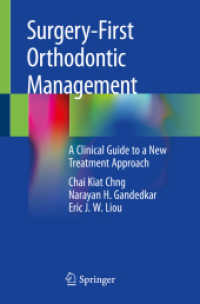Full Description
Teachers not only serve as caretakers for the students in their classroom but also serve as stewards for society's next generation. In this way, teachers are charged with responsibility for the present and the future of their world. Shouldering this responsibility is no less than an existential dilemma that requires not only professional solutions but also personal responsibility rooted in subjective authenticity. In the edited volume, authors will explore how the philosophy of Existentialism can help teachers, teacher educators, educational researchers, and policymakers better understand the existential responsibility that teachers shoulder.
The core concepts of Existential philosophy explored in this edited volume imply that a teacher's lived experience cannot be defined solely by professional knowledge or dictates. Teachers have the capacity to create subjective meaning through their own agency, and there is no guarantee that those subjective meanings will accord with professional dictates. Furthermore, there is no guarantee that professional dictates are more valid than the existential realities of individual teachers. The philosophy of Existentialism encourages individuals to reflect on the existential realities of isolation, freedom, meaninglessness, and death in an effort to propel individuals towards more authentic ways of engaging in the world. The chapters of this edited volume advance the argument that being and becoming a teacher must be understood - at least in part - from the subjective perspective of the individual and that teachers are responsible for authoring the meaning of their lives and of their work.
Contents
Preface — Considering Teaching and Teacher Development from an Existential Perspective: An Introduction; Aaron S. Zimmerman.
Section I. Existentialism And Curriculum And Instruction.
Chapter 1. Possibility and Rebellion in Sartre and Camus: Existential Possibilities for Education; James M. Magrini and Elias Schwieler.
Chapter 2. Learning Objectives Reconsidered in Light of Existential-Phenomenology and Mindfulness; Glen L. Sherman.
Chapter 3. A Precious Darkness: Utilizing Existential Loneliness to Achieve Culturally Relative Self-Actualization in the Classroom; Christopher Kazanjian and Sandra Kazanjian.
Section II. Existentialism And Assessment.
Chapter 4. Under Observation: Student Anxiety and the Phenomenology of Remote Testing Environments; Tyler Loveless.
Chapter 5. Assessments of Ambiguity; Steven J. Fleet.
Section III. Existentialism And Teacher Development.
Chapter 6. Kierkegaard and the Power of Existential Doubt in Teaching: Transformation of Self and Profession; Dan Riordan, Paul Michalec, and Kate Newburgh.
Chapter 7. Rational Communication in University Education: A Jaspersian Theory; Daniel Adsett.
Chapter 8. Foundations of Education: Absurdity and Ambiguity; Stephanie Schneider.
Section IV. The Teaching Of Existentialism.
Chapter 9. Agency Precedes Essence: Existentialism, Ecology, and the New Materialisms; Daniel O'Dea Bradley.
Chapter 10. Teaching Is ¦ Other People: Existential Reflections on Coteaching Phenomenology With Undergraduate Students; Lauren Manton, Brigid Flaherty, Cecelia Little, and Peter Costello.
About the Authors.






